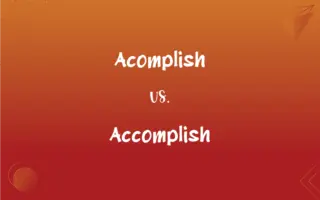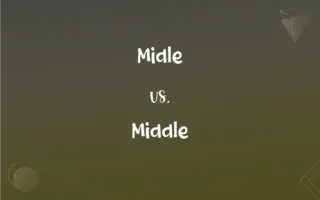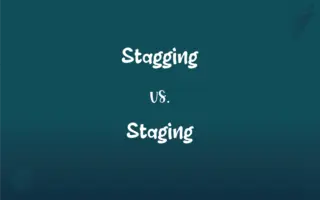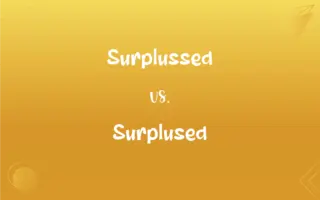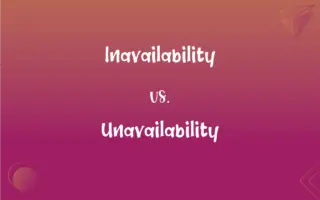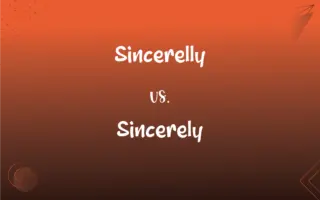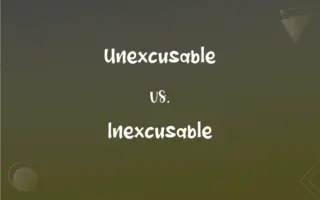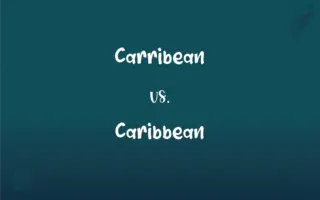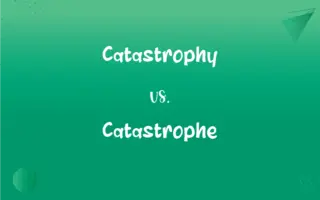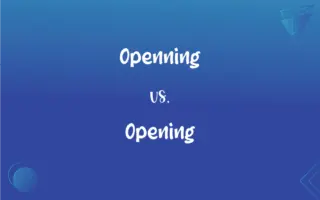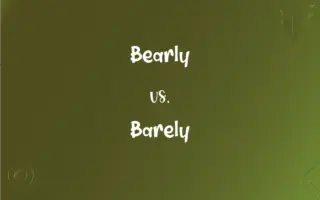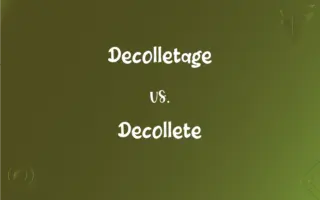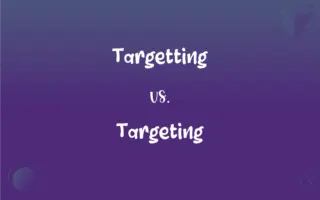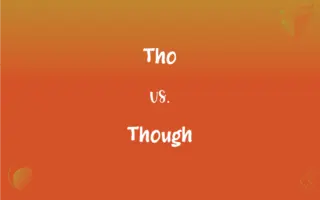Foregoe vs. Forego: Mastering the Correct Spelling
Edited by Aimie Carlson || By Janet White || Published on March 30, 2024
"Foregoe is an incorrect spelling; the correct spelling is 'forego', which means to do without or abstain from."
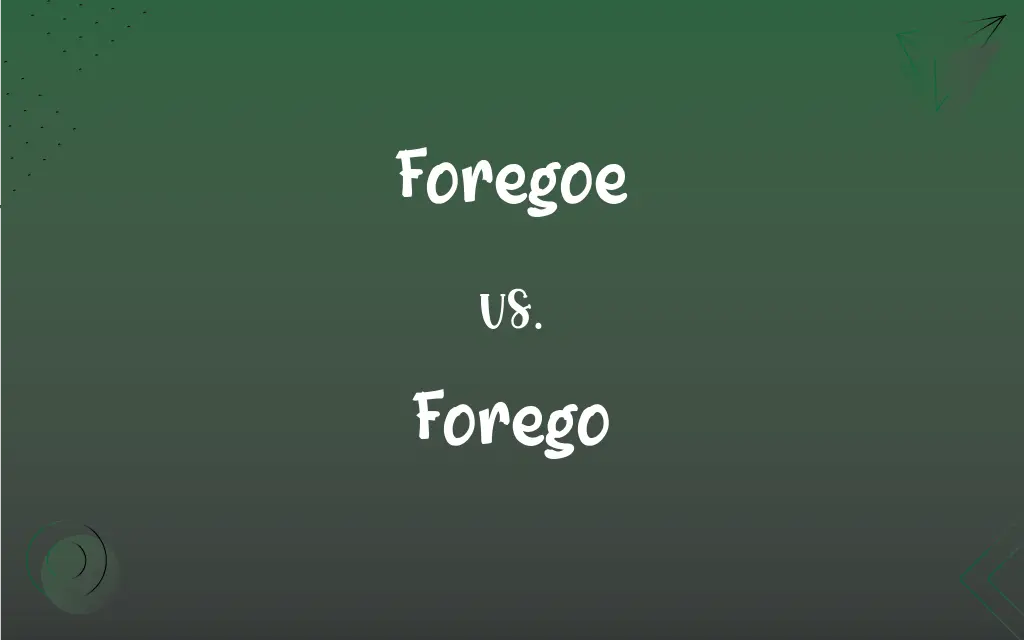
Which is correct: Foregoe or Forego
How to spell Forego?

Foregoe is Incorrect

Forego is Correct
ADVERTISEMENT
Key Differences
Associate "forego" with simplicity; the action of foregoing is straightforward, as is its spelling.
Practice by using "forego" in sentences focusing on its meaning of abstention or precedence, reinforcing the spelling.
Remember, "forego" means to precede or to abstain, which does not need an extra "e."
Think of "forego" as combining "before" (fore-) and "go," implying to go without beforehand.
Note that "go" does not gain an "e" when prefixed with "fore-," unlike "foresee."
ADVERTISEMENT
Correct usage of Forego
She decided to foregoe her morning coffee to save time.
She decided to forego her morning coffee to save time.
The team agreed to foregoe the bonus to ensure the company's stability.
The team agreed to forego the bonus to ensure the company's stability.
They chose to foregoe the traditional ceremony in favor of a simpler event.
They chose to forego the traditional ceremony in favor of a simpler event.
I had to foregoe my vacation plans due to unforeseen work commitments.
I had to forego my vacation plans due to unforeseen work commitments.
He was willing to foregoe his share of the profits for the greater good.
He was willing to forego his share of the profits for the greater good.
Forego Definitions
Forego means to abstain from or do without something.
He decided to forego dessert to maintain his diet.
Forego involves giving up the right or opportunity to something.
She chose to forego her chance to speak at the conference.
In legal or formal contexts, forego can refer to the act of forgoing a claim or right.
The claimant decided to forego any further legal action.
To forego can also mean to precede in place or time.
The introduction will forego the main text in the book.
To forego might mean to waive a requirement or privilege.
The fee was foregone for early registrants of the event.
To precede, as in time or place. See Usage Note at forgo.
Variant of forgo.
To abstain from; relinquish
Unwilling to forgo dessert.
Forego Sentences
She had to forego her morning run because of the rain.
He decided to forego dessert to stay healthy.
I'll forego watching TV to finish this book tonight.
To save money, they decided to forego eating out this month.
He's willing to forego sleep to complete the project on time.
They chose to forego the party to study for their exams.
Foregoing the use of plastic has become an important environmental practice.
They chose to forego buying a new car to save for their home.
To reach his savings goal, he had to forego some luxuries.
They agreed to forego their annual bonus to help the company recover.
Foregoing fast food has improved his health significantly.
She was prepared to forego her comfort for the sake of the expedition.
Foregoing immediate gratification can lead to long-term benefits.
Foregoing the elevator and taking the stairs is a healthy choice.
To improve their relationship, they decided to forego blaming each other.
Foregoing short-term profits for sustainability is becoming more common in business.
To adopt a minimalist lifestyle, he decided to forego unnecessary possessions.
Foregoing traditional publishing, she decided to self-publish her book.
Forego Idioms & Phrases
Forego one's desires for the greater good
This means to sacrifice one's personal wants for the benefit of others.
The leader chose to forego his desires for the greater good, ensuring the welfare of his people.
Forego pleasure for duty
This phrase means to sacrifice personal enjoyment in favor of responsibility.
The soldier had to forego pleasure for duty, serving his country with dedication.
To forego something for a good cause
This means to give up something for a beneficial reason.
She decided to forego her birthday gifts for a good cause, asking for donations to charity instead.
To forego the present for the future
This means to give up immediate satisfaction for long-term goals.
He decided to forego the present for the future, saving his money for education instead of spending it on gadgets.
To forego convenience for quality
This means to give up ease or comfort in favor of a higher standard.
She decided to forego convenience for quality, cooking meals from scratch instead of buying fast food.
Forego the known for the unknown
This means to leave behind familiar situations to venture into new, uncertain areas.
The entrepreneur had to forego the known for the unknown, leaving his job to start his own business.
Forego personal gain for ethical principles
This means to give up personal benefits to uphold moral values.
The journalist chose to forego personal gain for ethical principles, refusing to publish unverified information.
Forego the spotlight for privacy
This means to choose not to seek public attention or fame in order to maintain a private life.
After years in the public eye, the celebrity chose to forego the spotlight for privacy, moving to a secluded location.
To forego immediate success for long-term achievement
This means to sacrifice quick wins in favor of achieving more significant goals over time.
The athlete decided to forego immediate success for long-term achievement, focusing on rigorous training for future competitions.
To forego the easy path for the right path
This means to choose a more difficult or less convenient option because it is morally or ethically correct.
Faced with a tough decision, he chose to forego the easy path for the right path, even though it was more challenging.
Forego comfort for adventure
This means to give up comfortable or secure environments to seek thrilling or challenging experiences.
They chose to forego comfort for adventure, backpacking across remote regions instead of staying in luxury hotels.
To forego rest for work
This means to sacrifice leisure or relaxation time to continue working or being productive.
During the product launch, the team had to forego rest for work to meet their tight deadlines.
To forego personal interests for communal harmony
This means to set aside one's own preferences or benefits to ensure peace and unity within a community.
In the interest of communal harmony, the community members decided to forego personal interests during the negotiations.
To forego modern conveniences for a simpler life
This means to give up the use of modern technologies or amenities to lead a more basic and less complicated lifestyle.
Seeking a change, the couple decided to forego modern conveniences for a simpler life, moving to a rural area to farm and live off the land.
Forego short-term pleasures for long-term health
This means to avoid indulging in immediate gratifications that might be harmful in the long run for the sake of maintaining good health.
To improve her health, she decided to forego short-term pleasures like eating junk food for long-term health benefits.
FAQs
What is the verb form of forego?
The verb form is "forego."
What is the pronunciation of forego?
The pronunciation is /fɔːrˈɡoʊ/.
What is the root word of forego?
The root word is "go," with the prefix "fore-" meaning before.
Which vowel is used before forego?
The vowel "o" is used in the prefix "fore-" before "go."
Which preposition is used with forego?
Prepositions such as "for" or "in favor of" can be used with forego, depending on context.
Why is it called forego?
It is called forego because it means to go before or to abstain from something beforehand.
Is forego an abstract noun?
Forego is a verb and does not serve as a noun.
What is the singular form of forego?
The singular form is "forego."
Which article is used with forego?
As a verb, forego is not typically used with articles. When used in noun form, articles like "a" or "the" might precede its nominalized form.
Is forego a negative or positive word?
Forego is neutral; its connotation depends on context.
What is the plural form of forego?
Forego does not have a plural form; as a verb, its form changes with tense, not number.
Is the word forego is imperative?
Forego can be used in the imperative mood when giving a command or instruction.
How do we divide forego into syllables?
Fore-go.
What is a stressed syllable in forego?
The second syllable, "go," is stressed.
How is forego used in a sentence?
"To save money, they decided to forego buying a new car."
Which conjunction is used with forego?
Conjunctions such as "and" or "but" can be used in sentences with forego.
Is forego an adverb?
No, forego is not an adverb.
Is the forego term a metaphor?
Forego can be used metaphorically in certain contexts but is not inherently a metaphor.
How many syllables are in forego?
There are two syllables in forego.
Which determiner is used with forego?
As a verb, forego does not typically require a determiner.
What is the third form of forego?
The third form is "foregone."
Is forego a noun or adjective?
Forego is a verb.
What is another term for forego?
Another term for forego could be "abstain from" or "give up."
What is the first form of forego?
The first form is "forego."
What is the second form of forego?
The second form is "forewent."
Is forego a vowel or consonant?
The question does not apply as forego is a word, not a single letter. It contains both vowels and consonants.
Is forego a countable noun?
Forego is not a noun; it is a verb.
Is forego a collective noun?
No, forego is not a collective noun.
What part of speech is forego?
Forego is a verb.
What is the opposite of forego?
The opposite of forego could be "embrace" or "indulge in."
About Author
Written by
Janet WhiteJanet White has been an esteemed writer and blogger for Difference Wiki. Holding a Master's degree in Science and Medical Journalism from the prestigious Boston University, she has consistently demonstrated her expertise and passion for her field. When she's not immersed in her work, Janet relishes her time exercising, delving into a good book, and cherishing moments with friends and family.
Edited by
Aimie CarlsonAimie Carlson, holding a master's degree in English literature, is a fervent English language enthusiast. She lends her writing talents to Difference Wiki, a prominent website that specializes in comparisons, offering readers insightful analyses that both captivate and inform.
